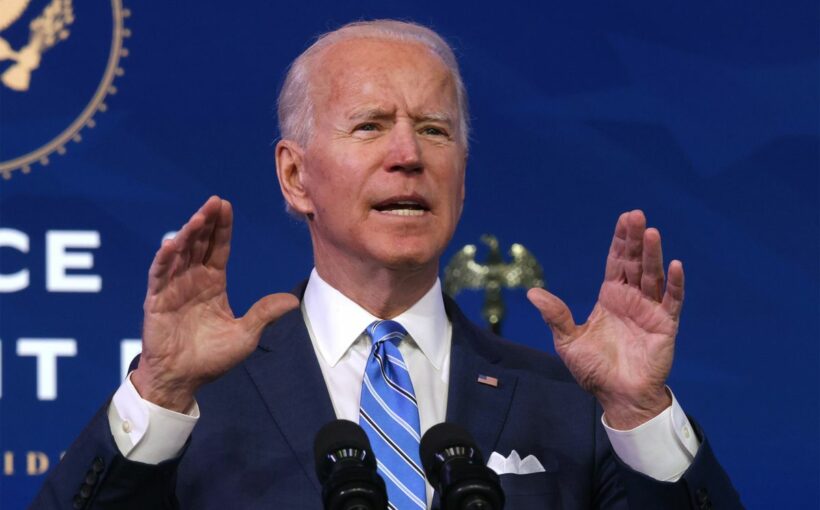President-Elect Joe Biden proposed to overhaul eligibility rules for coronavirus vaccines and open more sites for distribution but his plan to significantly ramp up U.S. inoculations largely retains the bones of the Trump administration’s system.
Ahead of remarks in Wilmington, Delaware, Biden’s office released changes he’d make to boost vaccination rates. His pledges are vague about timelines, reinforcing Biden’s previous warnings that there’ll be no quick fix to the virus spread in the U.S.
“We didn’t get into all of this overnight. And we won’t get out of it overnight, either,” Biden said. “We remain in a very dark winter.”
Biden and his aides have increasingly criticized the Trump administration’s vaccine rollout, which has fallen well short of inoculation targets. But the president-elect’s plan amounts to a revision of Trump’s effort, not a rewrite.
“The vaccine rollout in the United States has been a dismal failure so far,” he said. Five changes, he said, will help the U.S. meet his goal of 100 million doses in his first 100 days in office. Biden said he’d ask people to “mask up” for 100 days after his inauguration — calling it a “patriotic act” — and make face masks a requirement on federal property and for interstate travel.
“You have my word: We will manage the hell out of this operation,” he said.
Biden Asks Americans to ‘Mask Up’ for 100 Days, Criticizing GOP
As president, Biden will encourage states to abandon a complex series of priority groups used to triage vaccinations and instead focus on giving shots to front-line essential workers and anyone 65 and older, according to an announcement Friday by his transition office. He plans to set up community vaccination centers and mobile clinics and “jump-start” an effort to make shots available at pharmacies.
Implementation of priority groups was driven by science but “has been too rigid and confusing,” Biden said. “There are tens of millions of doses of vaccine sitting around unused in freezers across the country” while people who want vaccinations can’t get them, he said. However, some of the delay is due to bottlenecks at the state-level.
He said he would instruct the Federal Emergency Management Agency to begin setting up community vaccination sites on his first day in office, in locations like gymnasiums, sports stadiums and community centers. “Mobile clinics moving from community to community” will partner will local health-care professionals to get vaccinations to “hard-to-reach” communities, he said. Bechara Choucair, Biden’s vaccine coordinator, said 100 vaccination sites will be set up by the end of February.
Pharmacy Plans
Biden’s administration also will work more closely with pharmacies to administer vaccines, though it was not clear how he would improve on partnerships they’ve already established with the government. It’s also not clear that they’ll get doses quickly, with states still clamoring for more.
Biden also said he’d use the Defense Production Act to boost the manufacture of vaccines and the supplies required to administer them, such as vials and needles. The announcement included few details.
“I’ve already asked the team and we’ve identified the suppliers who are prepared to work with our teams,” he said.
His fourth change, he said, is a previously announced plan to release more first doses of vaccines and hold fewer in reserve for second doses. The Trump administration announced it would make that shift this week. Biden said his administration would not change recommended dosing schedules that call for people to receive a booster shot three or four weeks after their first dose.
His fifth change, he said, will be more transparency for the vaccine program, including regular updates on progress toward vaccinating the population.
Biden’s team on Friday appointed former Food and Drug Administration Commissioner David Kessler as chief science officer of what it calls its Covid Response. They’re retiring the Operation Warp Speed name President Donald Trump used for the vaccination effort. Kessler will replace Moncef Slaoui, who served as the initiative’s chief scientist, and Kessler will focus on administering the vaccine.
Biden is preparing to be sworn in next week under heavy security in the aftermath of a deadly Jan. 6 riot at the U.S. Capitol, and against the backdrop of a raging pandemic that is the biggest crisis of his nascent presidency. The U.S. set records this week for daily coronavirus deaths — there were 3,899 on Thursday alone — while new cases and current hospitalizations hover near record-levels.
Relief Package
The president-elect unveiled his pandemic relief plan a day earlier, proposing a $1.9 trillion package that will face hurdles in Congress. On Friday, he further detailed the vaccination plan, some of which relies on passage of a new bill. For instance, he pledged to hire 100,000 public health workers to help with vaccinations and contact tracing.
Biden’s vaccination push for front-line workers includes teachers and grocery store employees, as well as health-care workers.
The Trump administration has sought to smooth out a rocky vaccine rollout. Since coronavirus vaccines were introduced in the U.S. in mid-December, 11.9 million doses have been administered, according to Bloomberg’s vaccine tracker. That represents just 39% of the shots that have been distributed.
The rollout is racing against the clock. The U.S. has had more than 23 million confirmed cases, and is regularly recording 250,000 new cases each day. About 389,000 Americans have died, with the U.S. on pace for 400,000 deaths by Biden’s inauguration.
Source: Read Full Article
